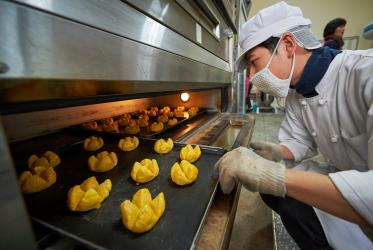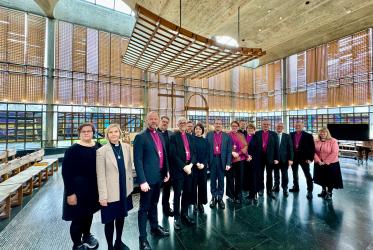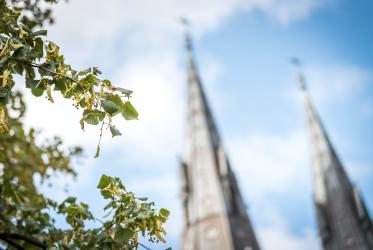Acts 6: 8 – 15
8 Stephen, full of grace and power, did great wonders and signs among the people. 9 Then some of those who belonged to the synagogue of the Freedmen (as it was called), Cyrenians, Alexandrians, and others of those from Cilicia and Asia, stood up and argued with Stephen. 10 But they could not withstand the wisdom and the Spirit[a]with which he spoke. 11 Then they secretly instigated some men to say, “We have heard him speak blasphemous words against Moses and God.” 12 They stirred up the people as well as the elders and the scribes; then they suddenly confronted him, seized him, and brought him before the council. 13 They set up false witnesses who said, “This man never stops saying things against this holy place and the law, 14 for we have heard him say that this Jesus of Nazareth[b] will destroy this place and will change the customs that Moses handed on to us.” 15 And all who sat in the council looked intently at him, and they saw that his face was like the face of an angel.
Acts is my favorite book in the New Testament. This is because it is in many ways about us. The successors. The witnesses. Although two thousand years apart, we also resemble these followers of Jesus. In Acts, the disciples have become more mature and responsible since the Gospels, where they were selfish and insecure. Now, in Acts, they understand what Jesus was talking about during the whole time they were with him. They preach and perform miracles. There is more of a structure around the group of Jews who are disciples of Jesus.
These verses that we have just heard, we read on Boxing Day in the Church of Sweden. Since the early church, that day has been the day of the martyrs: those who have witnessed about and sacrificed their lives for the Christian faith. Stephen is the first martyr of the Christian Church.
Stephen and the others that are mentioned in the verses preceding those we have just heard are counted as the first deacons in the Christian church. They were to take care of handling out the food, so that the others could devote themselves to prayer and the ministry of the word.
But according to the text, Stephen did more than handling the food. He also preached. We read that when Stephen preached about Jesus, people listened to him. He was obviously a speaker with great empathy and great pathos. It says that Stephen was a pure person who testified and preached about Jesus. The people were amazed at what Stephen said. He spoke with power.
But not everybody liked what they heard. To some of the Jews he did not preach what they wanted to hear, but on the contrary about things that would mean great changes. He became unbearable to them because he was pure and reflected the glory and light of God.
These verses also describe the reverse side of human life, selfishness, meanness, and slander for personal gain. The people, it says here, who wanted to silence Stephen, belonged to the synagogue of the Freedmen. That was a synagogue made up of Jews who traveled to Jerusalem with a common background. They were probably former slaves or prisoners of war from North Africa. Perhaps the description of who these people were is important to show that they were used to resorting to dirty methods and violence?
The light and truth that Stephen preached is revealing to us humans. These people from the Freedmen synagogue were afraid of what Stephen had to say and what those possible changes he talks about would mean for them. Maybe it would be too revealing for them? Their fear makes them want him away. And when arguing didn't work, they resorted to unsavory methods to get what they wanted. The council members were worried by the message that Stephen brought; that everything that has been, must be torn down and replaced with something new. And the group of people who were against Stephen managed to produce false witnesses to get Stephen convicted.
We can translate this human behavior to all times. From what we see on social media and news, we can't always be sure what is true. We always need to think about who the sender is and, if so, what purpose they have with what we see. Especially now when Chatt GPD is spreading, we can probably never again trust a picture, a film, or a text.
We see truth-telling people being slandered and belittled, others lying or twisting other people's statements out of context to look like lies. What can we trust and how can we know what is the truth? It is almost impossible. So obviously what is happening to Stephen is not a new phenomenon, it happened then and has probably as long as man has existed. Those who do not want to share power with anyone else or are afraid of changes have always produced false witnesses and alternative facts. We also see it around the world among political leaders today.
As for Stephen, it is a story about preaching the gospel and standing up for God's kingdom regardless of what those around you think and do. Regardless of whether it leads to death.
Martyrdom is a difficult thing. There are member churches of the WCC that have been minority churches for several hundreds of years, and still are, and which have deep experience of living under persecution and thus have martyrdom as part of their reality and perhaps even as part of their identity. It is a horrible reality. As a majority church, we in the Church of Sweden do not have that experience, but as a majority church and religion we have instead persecuted others throughout our history. In that we did wrong. What will happen when we also become a minority church remains to be seen.
But what we can ask ourselves as witnesses of Jesus' love is: do we stand up for our neighbor in the work we do, do we dare to defend God's smallest children, do we follow in the footsteps of Jesus in our development work? Do we ask ourselves What would Jesus do? How are we disciples of Jesus? By asking those questions we might get closer to be true witnesses of God´s love.






